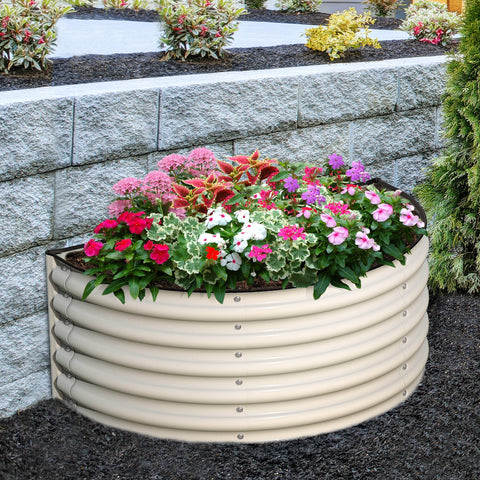Garden Bed Planting Guide: What Should Not Be Placed in the Soil?
A garden bed is an ideal place to grow your favorite vegetables, fruits, and herbs. However, in order to maintain the health and growth of plants, it is necessary to pay attention to what substances are placed in the soil. This article will provide a detailed introduction to what cannot be placed in the soil of a garden bed, and why these substances can cause harm to plants and the environment.
Firstly, garbage and waste cannot be placed in the soil of the garden bed. Placing garbage and waste in garden beds can attract pests and animals, which may disrupt plant growth and development. Bacteria and fungi in garbage and waste can also damage the health of soil, making it unsuitable for plant growth.
Secondly, petroleum products cannot be placed in the soil of garden beds. Petroleum products include petroleum, gasoline, lubricants, etc. These substances can cause soil toxicity and disrupt plant growth and development. If the soil contains petroleum products, plants will not be able to obtain sufficient water and nutrients, leading to poor growth.
Thirdly, chemicals cannot be placed in the soil of garden beds. Chemicals such as insecticides, herbicides, and fertilizers may contaminate soil, causing harm to human health and the environment. If chemicals are mixed into the soil of the garden bed, they will be absorbed by plants and may be ingested by the human body. This may lead to health issues and have irreversible impacts on the environment.
Fourthly, animal waste should not be overused in garden beds. Animal excreta contain high concentrations of nitrogen and phosphorus. Although these nutrients are important for plant growth, excessive use will lead to imbalance of soil fertility and affect plant growth. Therefore, when using animal waste, it is necessary to act according to one's abilities and ensure the use of appropriate amounts of fertilizer.
Finally, construction waste cannot be placed in the soil of the garden bed. Construction waste may contain lead, asbestos, and other harmful substances, and if mixed into the soil of garden beds, it may pose a threat to plants and human health. If construction waste is used, it may result in plants not being able to obtain sufficient nutrients and water, thereby affecting their growth and development. In addition, harmful substances in construction waste may seep into soil and groundwater, causing irreversible impacts on the environment.
Planting plants in garden beds requires consideration of the health and suitability of the soil. Therefore, before planting, it is necessary to clean up garbage and waste, and avoid placing petroleum products, chemicals, animal waste, and construction waste in the garden bed. On the contrary, organic fertilizers and compost should be applied to the soil, which can increase soil fertility and health, and provide the necessary nutrients and water for plants.
In addition, the health of the soil should be checked regularly and necessary measures should be taken, such as weeding and pest control, to ensure the health and growth of plants.
In summary, planting plants in garden beds requires attention to the health and suitability of the soil. Garbage and waste, petroleum products, chemicals, animal excrement, and construction waste cannot be placed in the soil of garden beds, as these substances may cause harm to plants and the environment. On the contrary, organic fertilizers and compost should be applied to the soil to increase soil fertility and health, and provide the necessary nutrients and water for plants.


